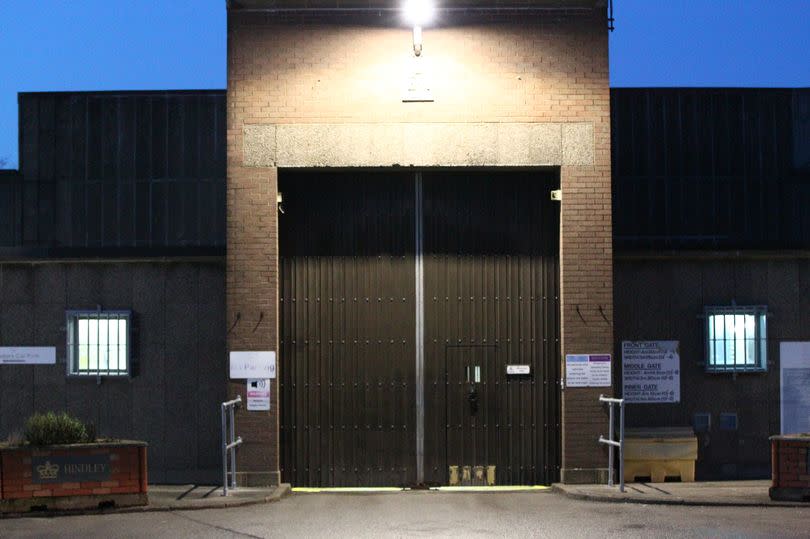Prison locked down with inmates shut in cells as bosses battle 'near-tsunami'
Inmates at HMP Hindley have been locked in the cells since Monday as bosses battle a 'near-tsunami' of drugs. A friend of one inmate told the Manchester Evening News lags hadn't been allowed out for a shower or exercise for two days until yesterday (Wednesday).
In March, inspectors found the prison in Bickershaw near Wigan was facing an 'uphill battle' as it dealt with high levels of violence, self-harm, organised crime and failing infrastructure, including a 'near-tsunami' of drugs inside the prison which houses 600 inmates.
Prison bosses confirmed the action since Monday was to tackle the supply of drugs and illicit phones inside the prison. The partner of one prisoner said the lockdown has been in force since Sunday and told the Manchester Evening News: "Even during Covid they were allowed one hour out a day and for the last four days, not any of the prisoners were allowed a shower or out of their cell.
READ NEXT: Missing Jay Slater: Inside the Tenerife drugs underworld as island branded 'the new Amsterdam'
"It isn’t right to keep them all locked up whilst a search is ongoing in the entire prison. They should at least let them out supervised for an hour or two. All visits have been cancelled."
A Prison Service spokesperson said: "In our efforts to keep staff and prisoners safe, we regularly carry out prison-wide searches to tackle contraband like drugs and mobile phones.” They confirmed their operation began on Monday.
The watchdog report published in March reported that tests found that more than half the inmates at HMP Hindley 'were on drugs at any one time'.
The jail also faces ongoing problems with 'very high' levels of violence, self-harm and links to organised crime. In a damning report HM Chief Inspector of Prisons Charlie Taylor said HMP Hindley faces an 'uphill battle' and that overall was 'still not safe enough'.
Mr Taylor said: "Hindley is facing an uphill battle: many prisoners arriving at the jail had an existing drug problem, and a large minority had known links to organised crime, so it's unsurprising that the prison had a near-tsunami of drugs. The situation was so bad that mandatory drug testing found more than half of prisoners were on drugs at any one time.
"Combined with the indolence, boredom and frustration created by a really poor regime, and some very inexperienced staff, it is no surprise that the prison just wasn't safe enough."
The comments came after HM Inspectorate of Prisons carried out its first full inspection of the jail since 2017 through an unannounced examination in November and December last year. Hindley is a category C training and resettlement prison for up to 600 men, of whom about a third are aged under 25.
Previous tests by the watchdog had found the prison was not sufficiently good in safety and respect, poor in purposeful activity but was reasonably good in rehabilitation and release planning. The inspection report said: "Our concern was that many of the fundamental weaknesses that we identified over five years ago had not changed: the environment was run-down, the regime was poor, and the prevalence of drugs was at the heart of much that undermined safety for prisoners."
Cramped accommodation, the old kitchen and the physical security of the prison were named as examples of the poor condition of the prison's infrastructure which meant it needed investment from HM Prison and Probation Service to deliver improvements.

The 'very high' levels of violence which were 'driven to a great extent by significant quantities of illegal drugs and a poor regime' were among other priority concerns. The report said: "The availability and use of illicit drugs posed a critical threat to the security of the prison, contributing to prisoner debt, bullying and fear."
"The positive drug testing rate at Hindley was the highest of all prisons in England and Wales, and work so far to tackle this crisis had achieved minimal impact."
Mandatory drug testing carried out during the inspection revealed a positive test rate of more than 52%, meaning that well over half the population were then active users. Many prisoners arriving at Hindley already had a drug problem and organised criminality will have influenced these outcomes, the report said.
Self-harm at the prison, which was included as a key concern, was 'high and was increasing'. The inspectors found that in the last 12 months, there had been 494 incidents of self-harm, which placed Hindley in the top three among comparable prisons.
Hindley was also facing serious staffing challenges, with a high number leaving within their first year of employment. More than 40% of basic grade officers had less than one year's experience, and 58% had less than two years.
Inexperienced officers were hampered in this challenging environment by a general lack of capability and confidence in supervising prisoners.
"We saw numerous examples of staff diffidence and an inability to confront rule breaking and delinquency among prisoners," the report states.
Time out of cell was limited and there were not enough activity places for the prison population. Almost a third of prisoners were unemployed and 28% were in part-time jobs. Unemployed prisoners typically had less than three hours a day out of their cells.
The prison, built in the 1960s and extended in the 1980s, was showing its age and needed investment, including to upgrade physical security, which would help to reduce the influx of drugs, said the report. A radical re-build and expansion programme, which included essential improvements, has been delayed until at least 2027.

 Yahoo News
Yahoo News 
